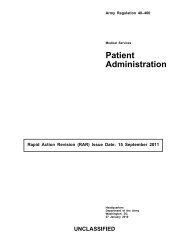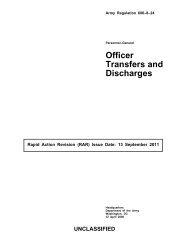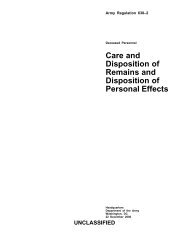AR 600-20, Army Command Policy - Army Publishing Directorate ...
AR 600-20, Army Command Policy - Army Publishing Directorate ...
AR 600-20, Army Command Policy - Army Publishing Directorate ...
You also want an ePaper? Increase the reach of your titles
YUMPU automatically turns print PDFs into web optimized ePapers that Google loves.
J–1. Purpose<br />
Medical services offered to victims of sexual assault include the option to elect a SAFE in addition to the general<br />
medical care related to sexual assault response. The SAFE is an examination of a sexual assault victim by a health care<br />
provider (HCP), who, ideally, has specialized education and clinical experience in the collection of forensic evidence<br />
and treatment of these victims. The forensic component includes gathering information from the victim for the medical<br />
forensic history, an examination, documentation of biological and physical findings, collection of evidence from the<br />
victim, and follow-up as needed to document additional evidence.<br />
J–2. Process<br />
The process for collecting and preserving sexual assault evidence under the restricted reporting option is the same as<br />
takes place under the unrestricted reporting option, except that the restricted reporting option does not trigger the<br />
official investigative process and any evidence collected has to be documented in a way that ensures the confidentiality<br />
of a victim’s identity.<br />
J–3. Procedures<br />
Restricted reporting allows a victim of sexual assault who is a Soldier to disclose on a requested confidential basis, the<br />
details of his or her assault to specifically identified individuals and receive medical treatment and counseling; this may<br />
include a SAFE at the victim’s request.<br />
a. If requested by the victim, a SAFE will be conducted by the appropriate HCP. The SAFE exam is the victim’s<br />
option as are other general medical services related to the sexual assault.<br />
(1) Sexual assault reporting procedures require that the S<strong>AR</strong>C be notified of all incidents of reported sexual assault.<br />
The S<strong>AR</strong>C, in turn, will assign a VA to assist the victim.<br />
(2) If a victim initially seeks assistance at a medical facility, S<strong>AR</strong>C notification must not delay the treatment of any<br />
medical conditions requiring immediate attention for the health of a victim.<br />
(3) Once any emergent medical injuries have been treated, the S<strong>AR</strong>C or VA will—<br />
(a) Advise the victim of the reporting options available to them.<br />
(b) Explain the benefits and limitations of each option, especially the impact of any state mandatory reporting laws<br />
on restricted reporting.<br />
(c) Document the reporting option the victim selects using DD Form 2910 (Victim Reporting Preference Statement).<br />
(4) The S<strong>AR</strong>C or VA will inform the victim about the availability of an optional SAFE. If a victim chooses to<br />
undergo a SAFE, and the HCP determines a SAFE is indicated by the facts of the case, the HCP at military facilities<br />
that possess a SAFE capability will conduct the examination.<br />
b. Installation commanders, senior mission commanders, Joint Force Headquarters commanders, and geographically<br />
dispersed unit commanders who do not have a military treatment facility with SAFE capability will arrange transportation<br />
for the victim to and from a military facility or local off-base, non-military facility that has a SAFE capability.<br />
<strong>Command</strong>ers may also contract with a local sexual assault nurse examiner or other HCPs who are trained and<br />
credentialed to perform a SAFE, and have them report to the MTF to conduct the examination.<br />
(1) Whenever possible, military installations should have a formal MOU in place between military facilities and offbase,<br />
non-military facilities for the purpose of conducting a SAFE.<br />
(2) Geographically dispersed units and RCs will pursue through coordination or formal agreements a SAFE option<br />
for victims with supporting installation medical treatment facilities, civilian facilities, or local sexual assault nurse<br />
examiner who are trained and credentialed to perform a SAFE.<br />
(3) The S<strong>AR</strong>C or VA will ensure that the victim is aware of any local or state mandatory sexual assault reporting<br />
requirements that may limit the possibility of restricted reporting prior to proceeding with the SAFE at the off-base,<br />
non-military facility.<br />
c. For restricted reporting cases, the S<strong>AR</strong>C will generate an alphanumeric restricted reporting control number<br />
(RRCN), unique to each incident that will be used in lieu of personal-identifying information, to label and identify the<br />
potential evidence collected from a SAFE (for example, SAFE kit, accompanying documentation and personal effects,<br />
and clothing as appropriate). The following will also be done:<br />
(1) Upon completion of the SAFE, the HCP will package, seal, and label the potential evidence container(s) with the<br />
RRCN and notify the supporting provost marshal.<br />
(2) The provost marshal will be trained and capable of collecting and preserving evidence, to assume custody of the<br />
evidence, using established chain of custody procedures.<br />
(3) The MOA and MOU with off-base, non-military facilities should include instructions for the notification of a<br />
S<strong>AR</strong>C regardless of whether a restricted or unrestricted report of sexual assault is involved, evidence receipt procedures,<br />
application of an RRCN, and disposition of evidence back to the supporting provost marshal.<br />
(4) The RRCN and general description of the potential evidence will be entered into a log to be maintained by the<br />
provost marshal.<br />
(5) Evidence will be stored for 1 year from the date of the victim’s restricted report of the sexual assault.<br />
(6) At least 30 days prior to the expiration of the 1-year storage period, the supporting provost marshal will notify<br />
<strong>AR</strong> <strong>600</strong>–<strong>20</strong> 18 March <strong>20</strong>08<br />
107
















